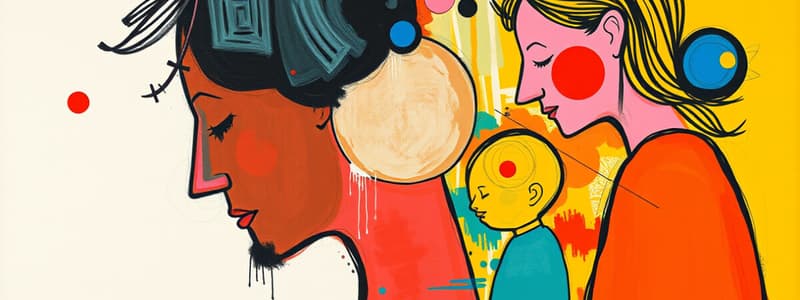Podcast
Questions and Answers
What does 'A' stand for in the ABC-X model?
What does 'A' stand for in the ABC-X model?
- Stressor event (correct)
- Perception of the event
- Degree of stress or crisis
- Resources
What are the three levels of resources (B) in the ABC-X model?
What are the three levels of resources (B) in the ABC-X model?
- Local, national, global
- Stressful, relaxing, neutral
- Individual, family, community (correct)
- Emotional, physical, financial
What does 'C' represent in the ABC-X model?
What does 'C' represent in the ABC-X model?
Perception of the event
Which of the following describes a broken 'X' in the ABC-X model?
Which of the following describes a broken 'X' in the ABC-X model?
A stressor event can be a positive or _____ event.
A stressor event can be a positive or _____ event.
True or False: Stress is the same as a stressor event.
True or False: Stress is the same as a stressor event.
What type of choices are classified under 'Type: Choice' in family stressors?
What type of choices are classified under 'Type: Choice' in family stressors?
Match the classifications of family stressors with their definitions:
Match the classifications of family stressors with their definitions:
What indicators suggest a family crisis?
What indicators suggest a family crisis?
Flashcards are hidden until you start studying
Study Notes
ABC-X Model of Family Stress
- Variables: A (stressor event), B (resources available), C (perception of the event), X (degree of stress or crisis).
A = Stressor Event
- Refers to events that can alter family dynamics or increase stress levels.
- Events can be both positive (e.g., marriage) or negative (e.g., death).
- Distinction: stressor events are stimuli, while stress is the response to these stimuli.
Classification of Family Stressor Events
- Sources of Origin: Internal (within the family) or external (outside the family).
- Type of Predictability: Universal/normative changes (expected life cycle events) or non-universal/non-normative (unexpected situations like catastrophes).
- Type of Clarity: Events can be clear (unambiguous) or ambiguous.
- Type of Choice: Events can be volitional (chosen) or nonvolitional (unwanted).
- Duration: Stressors can be cumulative (ongoing) or isolated (single incident).
B = Resources (Three Levels)
- Resources include traits, characteristics, or abilities that help families manage stress.
- Resources are assessed at three levels: individual, family, and community.
C = Perception of Stressor
- Refers to the family's interpretation and meaning attached to the stressor.
- Perception can vary widely, influencing responses to stress.
- Collective perception may not always be accurate but reflects shared views within the family.
X = Stress and Crisis
- The response of a family to the demands imposed by the stressor.
- Stress levels depend on the resources available (B) and perception (C).
- Stress can be a normal response and is not always negative or undesirable.
Broken X = Crisis
- A crisis occurs when stress overwhelms the family’s equilibrium, leading to dysfunction.
- In crisis, the family may feel immobilized and incapable of functioning effectively.
- Stress does not inevitably lead to a crisis; it is contingent on the resources and perceptions involved.
Indicators of Family Crisis
- Failure to maintain boundaries and roles among family members.
- Inability of members to function optimally, leading to poor decision-making, problem-solving, and self-care.
- Shift in focus from family welfare to individual survival, often indicative of a crisis state.
Studying That Suits You
Use AI to generate personalized quizzes and flashcards to suit your learning preferences.




